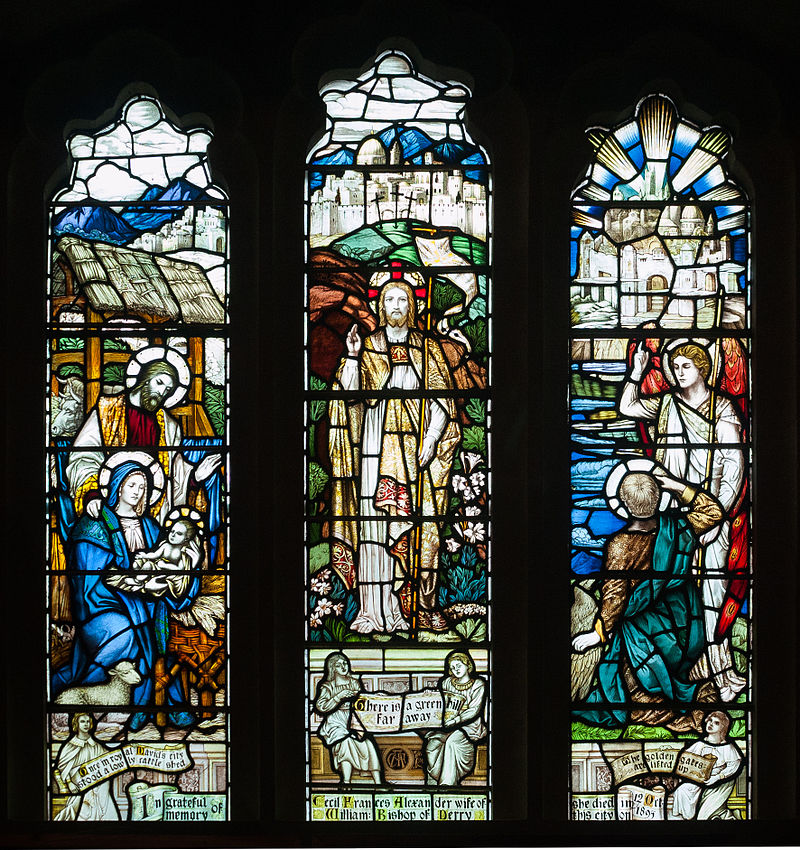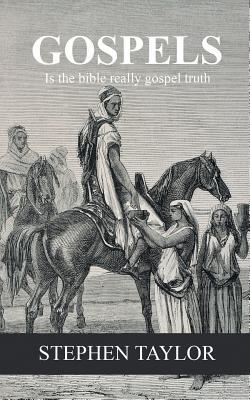|
Everyone knows the hymns All Things Bright and Beautiful and Once in Royal David’s City but how many people know about the woman who wrote them? Cecil Frances Alexander was born in Dublin in 1818 to Major John and Elizabeth Humphreys. She began writing verses at an early age and was later inspired by the Oxford Movement, which combined the Church of England with older teachings of the church to form Anglo-Catholicism. One member of the Oxford Movement, John Keble, later helped Alexander to edit her notable book Hymns for Little Children.
By 1840, Alexander’s hymns were well-known in the Church of Ireland. In 1850, she married the soon-to-be Bishop of Derry and Archbishop of Armagh, William Alexander. Their daughter, Eleanore Jane Alexander, inherited her mother’s gift for words and became a well-known poet. As a bishop’s wife, Alexander used the proceeds from her hymn books to help several charities. In the Diocese of Derry and Raphoe, her donations assisted in the founding of the Diocesan Institution for the Deaf and Dumb. She was also provided support at the Derry Home for Fallen Women and was an "indefatigable visitor to poor and sick". After her death in 1913, Alexander was commemorated with a stained glass window at St Columb’s Cathedral in Derry. Comprising of three windows, the memorial references three of her hymns: One in Royal, There is a Green Hill Far Away and The Golden Gates are Lifted Up. Many of Alexander’s hymns were targeted at children to help them learn the Apostle’s Creed. All Things Bright and Beautiful was based on the opening clause, “I believe in God, the Father Almighty, maker of heaven and earth.” Once in Royal David’s City, was inspired by the clause “I believe in Jesus Christ, our Lord, who was born of the Virgin Mary”. Originally intended to be sung in Sunday Schools, the hymn is now one of our most popular Christmas Carols. The hymn was put to music by Henry John Gauntlett and since 1919, the Kings College Chapel Cambridge has used the carol as their processional hymn at the Nine Lessons and Carols service. The Kings College Choir began the tradition that the first verse should be sung by a soloist and it was also the first song they recorded for public consumption in 1948. The phrase “Suffered under Pontius Pilate, was crucified, dead and buried,” inspired the hymn There is A Green Hill Far Away. Explaining Jesus’ death to young children has always been a challenge and Alexander wished to pen something that would make it easier. Inspired by a barren green hill near her home, Alexander used the hymn to explain that Jesus died so that we could be forgiven. Having written so many hymns, it is surprising that Cecil Frances Alexander is not better known. Unfortunately, she lived at a time when women were not considered as important as men, which has resulted in her name being glossed over. Nevertheless, her words live on. Jesus calls us, o'er the tumult is another of her well-known hymns.
1 Comment
Is the Bible really gospel truth? This is the question the honourable, academic Robert Babcock aims to find out on his quest to find the earliest copies of the gospels in order to prove the reliability of the story of Jesus as recounted in the King James Bible. However, this is not the key focus of Stephen Taylor’s fictional novel, Gospels. The main character is the perfidious John Campbell-John, a rogue, imposter and swindler who flees 19th-century England in an attempt to escape from his debts.
John meets the magnanimous Robert in Venice and, despite being polar opposites, become firm friends. After being honest for the first time in his life, admitting to owing thousands of pounds in gambling debts, Robert offers John the opportunity to accompany him on his quest through the deserts of Egypt. John accepts and the pair finds themselves on an adventure of discovery and personal redemption. John and Robert make an unlikely but excellent team. Robert’s knowledge of the Bible and ancient history is vital, however, John’s propensity for falsehoods and cunningness gets them out of a few scrapes and tricky situations. Nonetheless, it is difficult for John to give up his old ways and his insular behaviour threatens to get them in more trouble. Fortunately, Robert’s humility begins to influence the young scoundrel, as does his penchant for historical artefacts. As the story progresses, John begins to leave his past behind and becomes interested in Robert’s work, learning new things about Egyptian culture and the origins of the Bible. However, when a new gospel comes to light that threatens the whole of Christianity, Robert does not know what to do; and only John can give him counsel. John Campbell-John is a character that the author introduced in a previous book. However, the timelines are not sequential, therefore Gospels is a stand-alone novel. The time frame for this book needed to be set in 1835 to correspond with historical truths. Although Robert’s discovery of a Gospel of Thaddeus Jude is an invention of the author, the quest itself is based on the journeys of three 19th-century Bible hunters. Stephen Taylor has conducted an enormous amount of research, including the biographies of Robert Curzon, Constantin von Tischendorf and Émile Amélineau who, on separate occasions, sought the same knowledge as the fictional Robert Babcock. Despite being titled Gospels, the novel, for the most part, focuses on John Campbell-John and his wicked ways. Through a first-person narrative, John explains his past, his betrayal of a friend, and his addiction to gambling. Initially, he has no qualms about his behaviour and acts only for himself and his selfish greed. Whilst Robert goes in search of knowledge, John goes on a journey of redemption, coming to terms with his previous wrongdoings. However, acknowledging these faults is not enough, he needs to turn away from these roguish ways. It is disappointing that the narrative does not focus more on the gospels, both real and imagined. There was enormous scope for an in-depth look at the life of Jesus and the inconsistencies in the Bible. The fictitious Gospel of Thaddeus Jude evokes a similar reaction in Robert as the Non-Canonical Gospel of Thomas found in the 19th-century had on many devout Christians. There was so much potential with this direction of thought, however, the author passes over it in preference to the life of John Campbell-John. Slow to begin but increasingly interesting as it progresses, Gospels is a book of many themes. History, both 19th-century and ancient; religion, although not a Christian story; and achievement and absolution combine together to produce a unique tale that takes the reader from the back alleys of London to the River Nile and the deserts of Sinai. A subtle clue in the prologue keeps readers alert as they await the conclusion of the adventure – an ending that ambiguously reveals whether John moves on from the follies of his past. The following article was written by Mr. A. Van der Broek of Stapleford Abbots and published in the February 1951 issue of Progress, the monthly magazine of Romford Congregational Church. We have heard and read a great deal about gambling lately. I hope we have all thought about it a good deal, too, because it is much more satisfactory if we can after due consideration come to an independent opinion from within rather than rely on others to solve these questions for us and to advice us on these matters.
There are many sides to the problem. Let's look a moment at the practical side first. Its usefulness. Or its wastefulness. Useful only as a source of excitement perhaps and by the way very useful and profitable of course to the promoters. But in its nature, a most wasteful pastime. Of every £1,000 paid by the public in entrance fees or whatever you may call it at least £100 is lost in running expenses, advertisements, salaries, printing, postage, office expenses, etc, etc. And the next week we have the same thing all over again. Therefore in order to gamble with £1,000 it costs the nation nothing less than £5,200 per year. This is not taking into account the loss of energy both by the public and by the staff which are helping to run the show. If all this consuming energy was turned into producing energy it would most certainly make a good deal of difference in our cost of living. Now let us consider the education or intellectual value of gambling. Crossword puzzles have a good deal of educational value but does the filling of football coupons stimulate anyone's intellectual aspirations? I am told that it really does not matter much whether you understand football or not. You can buy a special guide every week which gives you all the answers and you just copy them out. And judging from paper reports, well I believe the less you know about it and the less you expect from the results, the luckier you may be. To pin one's hope week after week on something the results of which we cannot materially influence must be in the long run damaging to a person's will, creative efforts and general intellect. This in turn may have damaging psychological repercussions. Continual disappointment is a potential danger to a person's mental stability. Now I would like to look at the question from a Christian or Biblical point of view. Has the Christian any special considerations when weighing up the pro's and con's of a particular question? I think he should have. I know it is not an easy thing to reckon with nor is it a very popular theme to touch, but should we not first and foremost ask ourselves the question whether or not anything we do is to the honour of God? Listen to St. Paul's advice in 1 Cor. 10:31: "Whatsoever ye do, do all to the Glory of God." The question, then, we have to ask ourselves is: Can gambling be used somehow to the honour of God? Or take another ruling from the New Testament, Romans 14:23: "Whatsoever is not of faith is sin." If we have faith in God is there any room for gambling? Now both these questions can be ridiculed quite easily. Yet I think that before we make up our minds definitely about gambling and any other thing for that matter, we do well to remember that our relationship with God places us in a very special position when we consider such questions, and let us not forget that we will have to give an account of all our deeds to God. The reason why, and the purpose whatfor, are two dominant facts to consider when weighing up whether or not we can agree to "gambling". You will now be able I think to see clearly the difference between a raffle in a church bazaar and the football pools, horse racing and suchlike. After all it is quite obvious that the buying of a ticket in a raffle at a church bazaar is not done for personal gain but only to help the work of the Church. It is equally obvious that the person who gambles on dog races or on the Stock Exchange does so for personal gain. (Legitimate trade in stocks and bonds cannot be identified with gambling). Now, when the Wednesday evening fellowship discussed gambling, one of the members of the brains trust pardoned a person for gambling because it was the only possible way for that person to ever stand a chance of obtaining enough money, to help his or her invalid mother. Well, then, this sort of gambling would seem to fall under the category of gambling not for personal gain and could not therefore be condemned. Another question arises, however, namely, is there no other way in which this unfortunate person could be helped? Surely it is a very bleak and poor outlook if she has to wait for the luck of the person who has taken pity on her. And we could not possibly pardon gambling because in one or two cases the reason is not personal gain but the desire to help the unfortunate. In our church such cases would be brought to the notice of the League of Good Samaritans and the person concerned would not have to wait for the lucky result of a football pool before receiving help, I feel sure! Another reason why we should say no to gambling is that the possibility of easy personal gain is a temptation to many a person to endanger or risk funds which are necessary for the well being of one's dependants or even worse than that - lay hands on funds which do not belong to the person who gambles with these. And if we allow gambling we are in my opinion in some measure responsible for the sin of others in the direction. This is of course only an opinion. Let every man be fully persuaded in his own mind, but in order to be fully persuaded let us consider the question from as many angles as seem opportune. And please do not forget the younger people are looking to us for guidance and counsel. Shall we think twice before we lightly dismiss the question with a "can't see anything wrong in it?". Inscription on a height at Windermere - John KebleThough who hast given me eyes to see And love this sight so fair, Give me a heart to find out Thee, And read Thee everywhere. It couldn't happen here - or could it?The minister of a fashionable church engaged a black servant and to his astonishment on the first Sunday saw Rastus all poshed up sitting in the front pew. Knowing the feelings of his congregation, the minister leaned from the pulpit and suggested to Rastus he should withdraw, which he did with some dignity but embarrassment as he walked down the aisle. The minister was also somewhat embarrassed and on reaching home tendered a sort of apology to his servant, but Rastus just said: "Oh, it's alright sah. When I got back home I just went down on my knees and told God about it and He said: 'Don't be afraid Rastus, I've been trying to get into that church for years and can't, so why should you worry?'" "Education does not mean teaching people to know what they do not know. It means teaching them to behave as they do not behave."
John Ruskin "Nothing is achieved without hard word." Dear All,
The background of this newsletter is Romans 12:9-21 and the Parable of the Prodigal Son (Luke 15:11-32) June is named after Juno, the queen of the gods and the goddess of marriage and weddings. This leads to the subject of commitment and loyalty. As Christians, we can be assured of God’s love for us; however dark and dismal the situation may be, we know that God is with us. We know, for instance, that God is with us now during these uncertain times. We have to show commitment to God in all of our dealings. As the marriage ceremony says, for richer or poorer, for better or for worse. So, we must stay married to God and build that relationship. The more we trust, the more our faith deepens. Even though we have rough times, we can be assured of God presence. But, like any marriage, it has to be worked on. There has to be understanding. Just as God knows us intimately, so we, in turn, must know God. What does God like? What pleases God? How can we get brownie points? If we work hard, then I believe the reward that knowing God is with us is the best gift we can receive. We can, of course, choose to divorce and separate ourselves from God. Don’t listen to his guidance, go our own way, and feel freedom untethered by God’s demands. But we can be assured that God is always waiting for us to return. When we do return, there is no retribution but a feast because God is so pleased you have returned. Fun Fact: it is said that the Bible can be read allowed from beginning to end in around 70 hours. Blessings, Martin |
©Copyright
We are happy for you to use any material found here, however, please acknowledge the source: www.gantshillurc.co.uk AuthorRev'd Martin Wheadon Archives
June 2024
Categories
All
|




 RSS Feed
RSS Feed